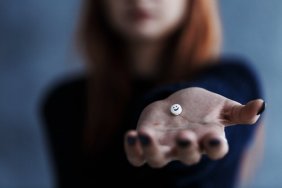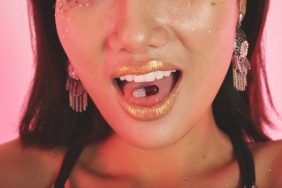Photo: Traditional tabs of LSD. William Rafti of the William Rafti Institute, courtesy of Wikimedia Commons.
Psychedelic drugs are back—and better than before as scientists around the globe have begun to explore potential benefits through a new practice called “microdosing.”
Also: Meet the Newest Superfood: Medicinal Mushrooms
This technique suggests people take anywhere between 1 to 10 micrograms of the drug (typically 10 times lower than the traditional tab) every three days so that the drug’s effects are so low as to avoid the responses people typically experience on LSD to reap benefits that include enhanced focus, productivity, and creativity, reduced reactivity, and potential relief from depression and pain.

Traditonal tabs of LSD, photo by Psychonaught. Courtesy of Wikimedia Commons.
According to Medical Xpress, neuroscientists at the University of Sussex recently released the results of a study that reveal that people under the influence of psychedelic drugs such as psilocybin (mushrooms), ketamine, and LSD, can achieve a higher state of consciousness, which is indicated by a sustained increase in neural signal diversity.
Professor Anil Seth, Co-Director of the Sackler Centre for Consciousness Science at the University of Sussex, revealed, “During the psychedelic state, the electrical activity of the brain is less predictable and less ‘integrated’ than during normal conscious wakefulness—as measured by ‘global signal diversity.’ Since this measure has already shown its value as a measure of ‘conscious level’, we can say that the psychedelic state appears as a higher ‘level’ of consciousness than normal.”
However, researchers stress that a higher state of consciousness is not inherently better or more desirable across the board. Rather, the finding is the basis by which scientists can begin to examine potential treatments for circumstances where brain activity is significantly impaired, such as in the case of severe depression.

At the same time, not everyone is willing to wait for scientists to develop treatments for their circumstances. After learning about the work done by Dr. James Fadiman, a pioneer in LSD research, author Ayelet Waldman decided to experiment on herself. She undertook a 30-day microdose treatment then recorded the results in her recent book, A Really Good Day: How Microdosing Made a Mega Difference in My Mood, My Marriage, and My Life (Penguin Random House).
The book is a fantastic read in the way it seamlessly transitions between personal memoir, self-proscribed study, and examination of the history of LSD—by a woman who was once a federal public defender working exclusively on drug-related crimes. While there are countless cringe-inducing moments scattered throughout the book, Waldman’s bare-naked approach to investigating her psychological and emotional struggles is commendable. At the same time, her reporting on LSD, combined with her knowledge working inside the criminal justice system, is very revealing about the way the drug has been vilified through a series of disinformation and other, highly questionable actions.

Dr. James Fadiman, photo by Scott Kline.
In speaking with Huffington Post, Dr. Fadiman observed, “What microdosing seems to do is rebalance people. Here’s a generalization, which is how I’ve come to this conclusion: A number of people, by the time they’ve finished a month, say, ‘I’m sleeping better, I’m eating more healthy food, I’ve returned to yoga and I’m doing meditation.’ They’ve improved their relationship to their body ― or their body has improved their relationship to them.”
Dr. Fadiman’s research is anecdotal, as he does not proscribe the drug or run experiments himself. As anyone who has ever taken a psychedelic drug is aware, it is a highly adaptable, idiosyncratic drug that hones in on where the user’s mind already lies. Thus the benefit of microdosing is that the amount is too small to create a radical effect—taking away the drugged-out energy that a larger serving would produce. Microdosing is not for anyone looking for a transcendental experience over the course of eight hours, but rather for people who would like to reach a basic functional stasis point.
Needless to say, buying and selling psychedelic drugs remains a felony in the United States.
Miss Rosen is a journalist covering art, photography, culture, and books. Her byline has appeared in L’Uomo Vogue, Vogue Online, Whitewall, The Undefeated, Dazed Digital, Jocks and Nerds, and L’Oeil de la Photographie. Follow her on Twitter @Miss_Rosen.








